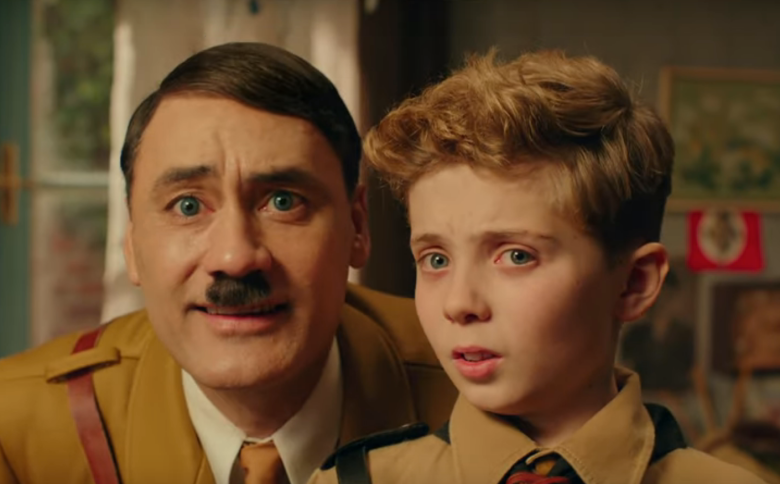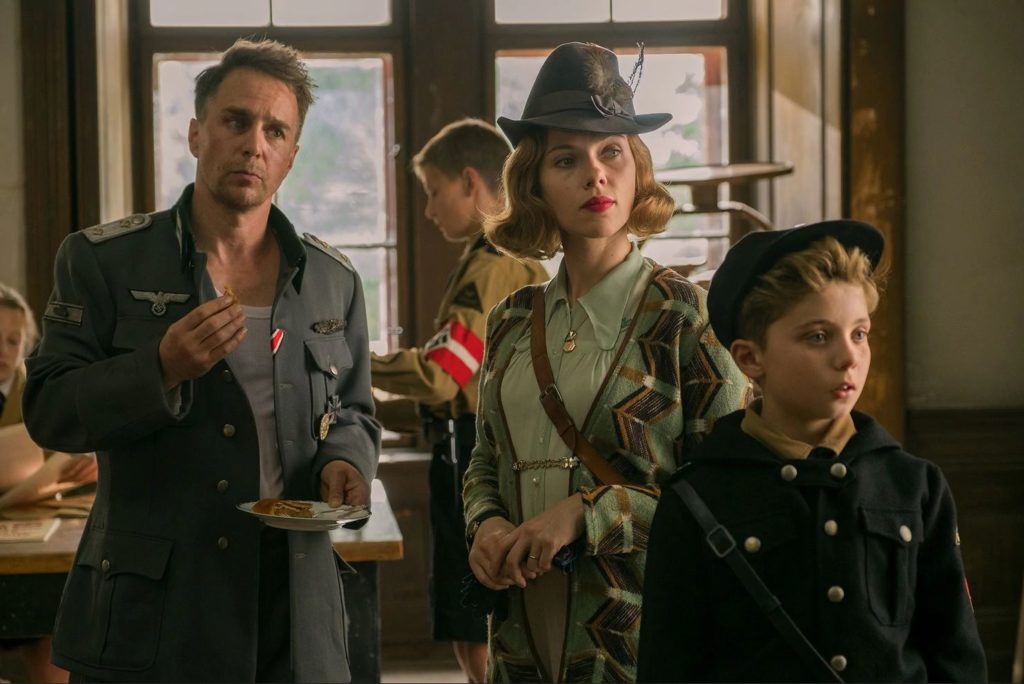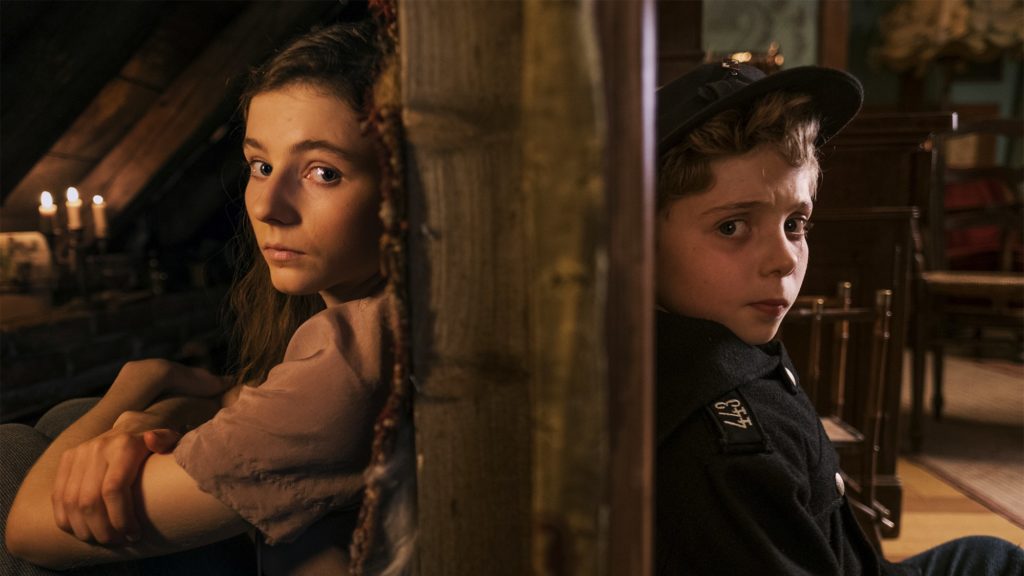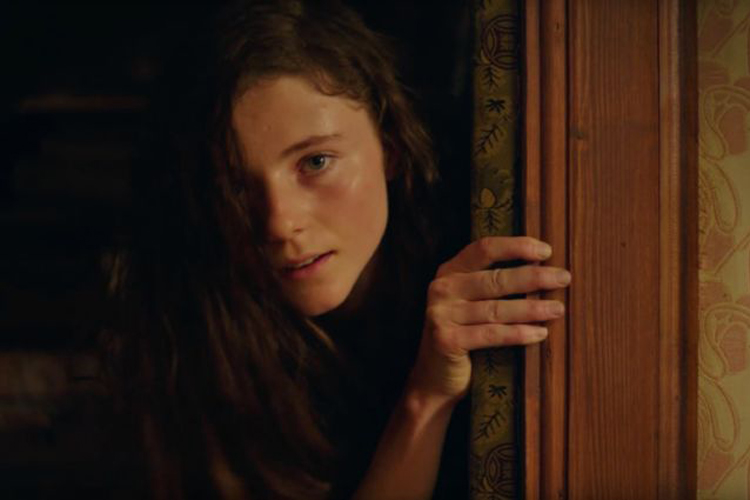
The rise of the Third Reich is such a blight on the world’s history, it’s no wonder we keep making fun of it. Sure, there are plenty of sober cinematic reconstructions of the era, so many that the Holocaust drama has practically become a genre unto itself. But the genocidal horror of Nazism is so obscene, so incomprehensible, that unless you’re Steven Spielberg, it can seem impossible to confront head-on, like staring into a black sun. Maybe it’s better to approach this unspeakable atrocity askance, to attack its ugliness and brutality not with outrage and solemnity, but with cleverness and mockery.
Or maybe it isn’t. Certainly some viewers will take umbrage at Jojo Rabbit, Taika Waititi’s comedy-drama-satire-coming-of-age-whatever, which is set in Germany in 1945 and which unfolds with an impish tone that, while hardly seditious, is decidedly less than utterly respectful. I’m not here to tell you what you can and can’t get mad about, but I will suggest that this awkward, weirdly sincere movie is too eager and silly to be truly offensive. Its parodic vision of Nazis as bumbling stooges feels like an appropriate portraiture, not so much trivializing evil as acknowledging its senselessness and banality. And so, my problem with Jojo Rabbit isn’t that it tries to be funny. My problem is that it isn’t funny.
At least, not consistently. There are a decent number of laughs in this film, though they feel faint among the innumerable flat jokes and dead spots. Waititi, who in addition to writing and directing (his screenplay is based on a novel by Christine Leunens) portrays the title character’s imaginary friend in the form of a preening Adolf Hitler, is a limber physical comedian with an impressive array of facial expressions. There is a cute runner involving unicorns, and a fairly brilliant gag featuring German shepherds. Sam Rockwell plays a one-eyed soldier with a thick accent named Captain Klenzendorf; he’s automatically funny whenever he opens his mouth.

But as a comedy—that is, as an assemblage of jokes intended to elicit laughter on a regular basis—Jojo Rabbit is largely a failure. There are long stretches of ostensible humor that flail around limply, deprived of comic oxygen. Supposed sight gags—Rebel Wilson wielding a machine gun, mishaps involving munitions, children bounding in the forest in Hitler Youth uniforms—seem oddly proud of themselves, as though their inanity is inherently hilarious. Waititi, who brought the funny to the Marvel universe with Thor: Ragnarok, possesses an admirably bizarre visual and verbal imagination, but here he seems to have confused wackiness with wit.
This is most apparent during Jojo Rabbit’s first act, which is by far its broadest and its worst. Ten-year-old Jojo (Roman Griffin Davis) has consumed so much propaganda that he’s now a Hitler zealot, practicing the pitch of his “Heil!” and fawning over the cut of his swastika. He’s excited to channel his enthusiasm into a sleepaway camp, which is technically run by the booze-swilling Klenzendorf but which seems to be dominated by teenage fascists. (The cheery colors and vibrant pop music are sufficiently reminiscent of a certain Wes Anderson picture that I wondered if the camp was called Goonrise Kingdom.) When these Aryan thugs aren’t teaching children how to throw hand grenades, they’re leading team-building activities designed to enhance their young charges’ military readiness—you know, like ordering Jojo to snap a bunny’s neck.
Jojo doesn’t find that assignment amusing, so he and I at least have something in common. But the faltering quality of these early scenes is disappointing, because they represent Jojo Rabbit at its most anarchic and distinctive; they’re suggestive of a real cinematic identity. Theoretically, they should distinguish the movie from the typical Holocaust yarn, and I suppose they do—just badly. It’s possible to conceive of a successful comic version of this material—a film that ruthlessly mocks the absurdity of the Nazis’ hateful rhetoric with droll intelligence—but that isn’t what we get. Instead, we get Jojo and his friend pondering just how Jews hide their horns.

It’s a brutal start. With time, however, Jojo Rabbit begins to drop its sardonic pretensions and transitions from a zany satire into a more traditional drama, even a prestige weepie. And as that process takes place—as Waititi slakes his thirst to provoke shocks and instead turns to harvesting tears—the film starts to find its footing. This is itself surprising; rare is the picture that improves as it grows more familiar and less transgressive. Perhaps the strangest thing about this movie is that it gets better as it becomes less strange.
So be it. Waititi may be best known for his irreverent sensibility—in addition to Ragnarok, his recent features include the vampire comedy What We Do in the Shadows and the wistful coming-of-age tale Hunt for the Wilderpeople—but he’s more effective here when he throttles down and focuses on story rather than antics. And following its desultory opening, the plot of Jojo Rabbit springs to life when Jojo, convalescing at home after an idiotic accident, discovers a Jew hiding in his attic.
Holy scheisse! Pint-sized fascist that he is, Jojo reacts to the emergence of Elsa (a wonderful Thomasin McKenzie) with terror and revulsion. How could his mother (a very fine Scarlett Johansson), a believed Nazi loyalist, have conspired in such an unpatriotic betrayal? What would his best mate Hitler do in such a situation? And seriously, where the fuck are Elsa’s horns??

One need not possess Waititi’s creative gifts to guess the answers to these questions, or to envision how the remainder of Jojo Rabbit will unfold; Jojo’s panic surrounding Elsa gradually gives way to curiosity and then to affection, while Elsa manages to locate in Jojo the compassionate sheep buried beneath the layers of wolf’s clothing. But despite the movie’s predictability—important lessons will be learned, hard hearts will be softened—it develops a pleasurable rhythm, thanks less to the boldness of the script than to the quality of the acting. Davis nimbly handles the more outlandish moments—watch as he repeatedly rebuffs Hitler’s offer of a cigarette—but he also brings genuine heft to Jojo’s social and moral awakening. The real star, though, is McKenzie. Having already shattered American hearts last year in Leave No Trace, the New Zealand actor flawlessly migrates to yet another continent here, revealing torrents of emotion through watchful stillness. On the page, Elsa is a facile construct of a character; on the screen, McKenzie turns her into a hero, full of fear and warmth and pain.
The scenes between Jojo and Elsa, which function as a sort of platonic courtship, are uncommonly thoughtful and tender. Thematically, however, Jojo Rabbit is frustratingly blunt, with Waititi abandoning his delicate paintbrush in favor of a cudgel. The film’s messages are so didactic, they feel lifted from a kid’s book report on tolerance. Nazis were bad. Bigotry is wrong. Jews and gentiles can get along. The real Holocaust was the friends we made along the way.
It’s all rather trite. Yet beneath Jojo Rabbit’s crude preachiness lies a movie that is deceptively well-made and even—dare I say it—entertaining. Waititi’s knack for quirky comedy may have deserted him, but he does exhibit a talent for building suspense, most notably in a chilling sequence where a band of SS clowns (led by Stephen Merchant) search Jojo’s house, hunting for whiffs of Anne Frankincense. He also delivers a late reveal—which calls back to a motif involving fumbled shoelaces—with a quiet bravado that only magnifies its impact. And a late scene featuring a highly symbolic coat evokes Schindler’s List and, more directly, The Pianist.
And so, Jojo Rabbit is skillful and enjoyable. It is also simplistic and treacly. It is, in other words, a movie made for someone like Jojo: a little awkward, earnestly energetic, and reassuringly sweet—but most of all, childish.
Grade: B-
Jeremy Beck is the editor-in-chief of MovieManifesto. He watches more movies and television than he probably should.
